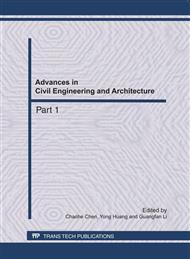p.4496
p.4501
p.4506
p.4511
p.4516
p.4520
p.4524
p.4528
p.4535
Study on Integrated Approaches of Water Resources Allocation in Tianjin
Abstract:
This study investigated the characteristics of various water resources in Tianjin, explored the needs for the study of water resources allocation, and identified the current issues of water resources allocation in Tianjin. The water resources allocation framework was established by adopting the cultural algorithm approach. A case study was done for Tianjin by utilizing this framework to evaluate the water resources allocation in 2008. It shows that the integrated approach of water resources allocation can effectively relieve the water shortage pressure of Tianjin, maximize the benefits for the limited water resources. This study provides a theoretical guidance for the water resources allocation in this area.
Info:
Periodical:
Pages:
4516-4519
Citation:
Online since:
May 2011
Authors:
Price:
Сopyright:
© 2011 Trans Tech Publications Ltd. All Rights Reserved
Share:
Citation:


